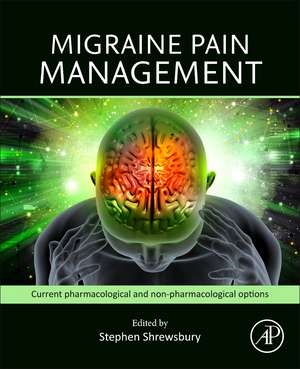Migraine Pain Management: Current Pharmacological and Non-pharmacological Options
Editat de Stephen B. Shrewsburyen Limba Engleză Paperback – 30 oct 2024
- Offers a comprehensive overview of pharmacological and alternative migraine pain treatment options
- Covers the historical developments and current targets for drug development and delivery routes
- Provides insights into comorbidities and their impact in patient compliance to treatment
Preț: 985.41 lei
Preț vechi: 1239.03 lei
-20% Nou
Puncte Express: 1478
Preț estimativ în valută:
188.58€ • 196.16$ • 155.69£
188.58€ • 196.16$ • 155.69£
Carte tipărită la comandă
Livrare economică 08-22 aprilie
Preluare comenzi: 021 569.72.76
Specificații
ISBN-13: 9780443247057
ISBN-10: 0443247056
Pagini: 636
Dimensiuni: 216 x 276 mm
Greutate: 0.45 kg
Editura: ELSEVIER SCIENCE
ISBN-10: 0443247056
Pagini: 636
Dimensiuni: 216 x 276 mm
Greutate: 0.45 kg
Editura: ELSEVIER SCIENCE
Cuprins
Part I: Foundations and historical development of migraine pain management
1. Introduction
2. Neuroanatomy and Neurophysiology
3. Historical overview of migraine product development
4. Comorbidities and their impact on therapies
5. Not all Migraine attacks are the same
6. Challenges and Controversies; Pharmacokinetics, Linguistics, Semantics and Statistics
Part II: Druggable targets
7. CGRP
8. PACAP
9. Src family kinases (SFK) in Migraine
10. Delta opioid receptor system
11. Piezo channels in peripheral trigeminal nociception
12. TRP antagonists
Part III: Drugs – Acute Management
13. Simple analgesics and combination oral products
14. Cannabinoids & Phytochemicals
15. Ergots
16. Triptans
17. Beta blocker (timolol) eye drops
18. Lasmiditan (and the ditan class)
19. Gepants
Part IV: Drugs – Prevention
20. TCAs (Tricyclic Antidepresants), SNRIs, Beta blockers, candesartan, flunarizine
21. Antiseizure orals (gabapentin, topiramate)
22. Onabotulinumtoxin
23. Gepants (for prevention)
24. (CGRP) Monocloncal antibodies
Part V: Administration routes
25. Oral Drugs (including SMEDDS)
26. Inhaled - oral & nasal
27. Subcutaneous/IM/Transcutaneous ("Injectables")
28. IV/Infusion
Part VI: Alternative Management
29. The role of digital platforms and smartphone apps
30. Herbal Medicines
31. Phototherapy
32. Neuromodulation
33. Acupuncture (for episodic and chronic migraine)
34. Manual Therapies
35. Nutraceuticals and Diets
36. Mindfulness
Part VII: Summary & conclusion [Shrewsbury]
37. Final Perspectives: oral/non-oral pharmaceuticals; devices; Complimentary practices
1. Introduction
2. Neuroanatomy and Neurophysiology
3. Historical overview of migraine product development
4. Comorbidities and their impact on therapies
5. Not all Migraine attacks are the same
6. Challenges and Controversies; Pharmacokinetics, Linguistics, Semantics and Statistics
Part II: Druggable targets
7. CGRP
8. PACAP
9. Src family kinases (SFK) in Migraine
10. Delta opioid receptor system
11. Piezo channels in peripheral trigeminal nociception
12. TRP antagonists
Part III: Drugs – Acute Management
13. Simple analgesics and combination oral products
14. Cannabinoids & Phytochemicals
15. Ergots
16. Triptans
17. Beta blocker (timolol) eye drops
18. Lasmiditan (and the ditan class)
19. Gepants
Part IV: Drugs – Prevention
20. TCAs (Tricyclic Antidepresants), SNRIs, Beta blockers, candesartan, flunarizine
21. Antiseizure orals (gabapentin, topiramate)
22. Onabotulinumtoxin
23. Gepants (for prevention)
24. (CGRP) Monocloncal antibodies
Part V: Administration routes
25. Oral Drugs (including SMEDDS)
26. Inhaled - oral & nasal
27. Subcutaneous/IM/Transcutaneous ("Injectables")
28. IV/Infusion
Part VI: Alternative Management
29. The role of digital platforms and smartphone apps
30. Herbal Medicines
31. Phototherapy
32. Neuromodulation
33. Acupuncture (for episodic and chronic migraine)
34. Manual Therapies
35. Nutraceuticals and Diets
36. Mindfulness
Part VII: Summary & conclusion [Shrewsbury]
37. Final Perspectives: oral/non-oral pharmaceuticals; devices; Complimentary practices
